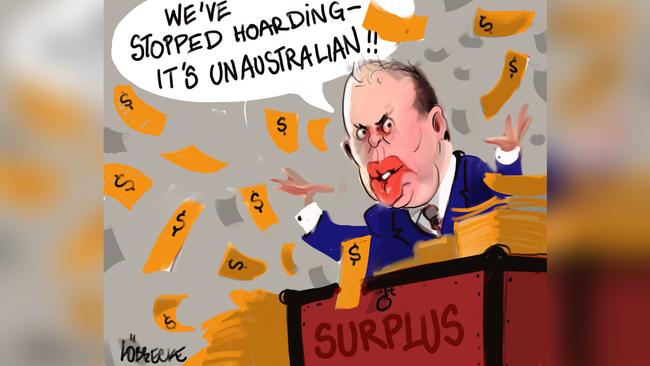
The struggle for small and indeed some big businesses in the wake of the coronavirus is very real and has prompted a seachange in government funding to business that will shortly be delivered by the federal government, with the Reserve Bank launching its significant contribution on Thursday afternoon.
The move comes amid fears the health crisis has quickly hit credit markets, which are effectively closed in Australia with zero demand for government debt.
It also comes as big business has gone some way to showing its new colours, with shareholders wearing the pain through trashed stock prices but business concerns being more with staff health and customers.
Just whether this ESG-principled approach works to achieve better long-term profits remains to be seen, but in this climate the focus is much more immediate.
Coles has an urgent need for some 5000 staff to help in stores packing shelves and the like, and some with short-term surpluses of staff — like the airlines — are talking about moving staff temporarily to the supermarket.
From Coles’s perspective, this means it is picking up well-trained staff with a known track record.
Other measures on offer include extended visa terms for offshore student workers to allow them to fill the gaps.
The government will abandon traditional reluctance to directly fund business based on the assumption that the impact of the virus will hopefully have a two-quarter timeline and the key is to ensure business can work through the downtime to quickly revive.
That way, the theory goes, the economic impact of the virus will be less severe.
The aim is to ensure businesses that without assistance may go under can actually survive, which will help the recovery.
The federal government is backed by state leaders like Victorian Premier Daniel Andrews, and the recent COAG meeting agreed to let the Feds take the running, with the states filling in where needed.
The funding theory is backed by AustralianSuper chief investment officer Mark Delaney, who stressed this point in an interview with The Australian on Wednesday, and ANZ’s Shayne Elliott backed direct funding in a Melbourne radio interview.
The difference, according to Elliott, is that, unlike a normal recession, based on the evidence in China and South Korea there is a clear horizon that means the bank can plan around it.
To help that cause, the government is shortly expected to unveil its so-called “corona loan” designed to keep small business off the insolvency line by granting three-year terms guaranteed in part by the Reserve Bank or the government, which clears the risk for the banks.
The subordinated loans would get around the insolvency trading rules, and low-interest terms would help the small business.
The interest holiday period could also be capitalised, which means the bank improves its position through a better loan-to-valuation ratio.
In essence the government takes the risk, the small business gets to survive and the bank wins some brownie points.
But the overall economy is also improved, which is where the exercise is aimed.
The RBA is also expected to cut official interest rates by another 25 basis points.
But while the increase in liquidity is welcomed, the reality, as ANZ’s Elliott told The Australian, is that there is not a lot of demand for new money right now.
What is needed instead, Elliott says, is for the banks to step away from their traditional ability to take money from people’s pockets through fees and charges and instead give them more flexibility to survive.
Westpac has already unveiled a deal for small business along similar lines to those affected by the bushfires.
Josh Frydenberg has been rushed by myriad business people with ideas on how to keep the economy running.
AustralianSuper’s Delaney told The Australian: “The key is to keep business whole.”
The health crisis will cause a massive shortage of funds for some sectors and by directing funds the government is helping them to recover quickly.
If the health side of the equation lasts longer than hoped for, the issue becomes a little more problematic.
But the way Delaney looks at it, “the market has front run the health crisis and is looking for some signs that will ease as well as confidence in a future recovery path”. That way it may front-run the recovery. That is the role he and others hope the government will play.
The advantage of keeping the moves at RBA level on the “corona loans” means there is less chance of the politicians overstepping the mark.
The RBA-backed loans are similar to those on offer from the Bank of England.
The key is to ensure the programs have a definitive end date, which is why the three-year loan terms are attractive.
One of the key legs to the GFC recovery plan was the bank deposit guarantee, which is still in place 12 years after the crisis ended and the need for one has long ago disappeared.
Super’s Silk road
AustralianSuper, like other companies, is running a team approach to managing with executives pairing so one works in the office and the other from home on a given day.
The equities team is running on two distinct floors, with the aim of minimising the risks of the disease laying down the entire team.
Chief Ian Silk had time at home but returned to the office on Wednesday, sparking some talk because he was also wearing a tie.
The $185bn fund giant is still collecting about $1bn a month in new funds, which is down from the record $20bn that flowed in last year.
Delaney agreed with the logic in UniSuper’s John Pearce’s move to suspend his stock-lending program, but AustralianSuper decided there were bigger issues to settle.
UniSuper was aiming to create some second thoughts around hedge funds shorting the market, but both Pearce and Delaney argue short sales help boost liquidity, which is better for the market.
The analogy is with the housing market, which can run away in a bubble because of the one-way market.
The industry funds are working on the principle that there is so much uncertainty in the market that investment strategies should be aimed long term.
Which, of course, also explains why Delaney would like the federal government’s support.








A revolution in government funding is in the offing, underlined by the line on Twitter on home workers saying “your grandparents went to war for the country, you are being asked to sit on the couch — you can do it”.